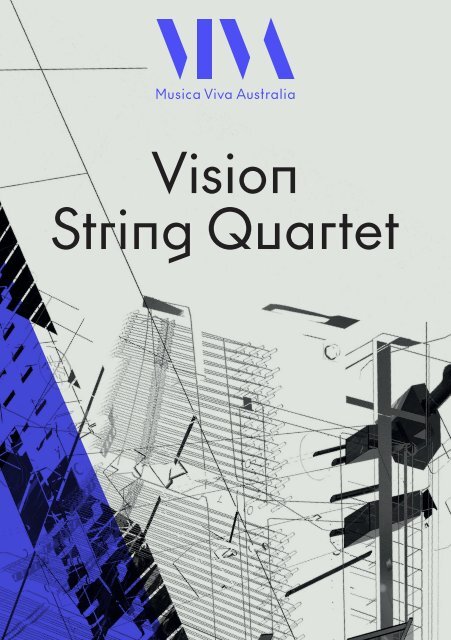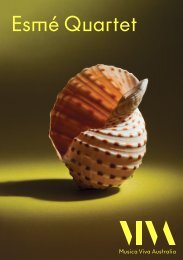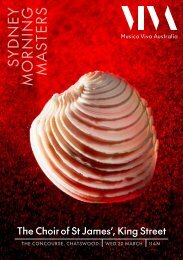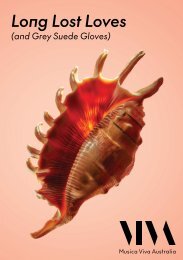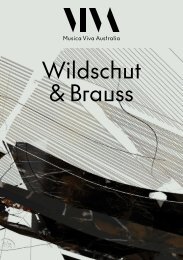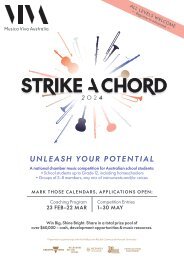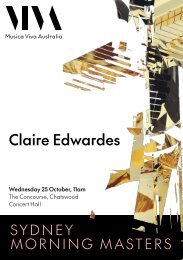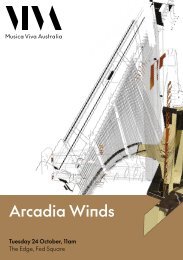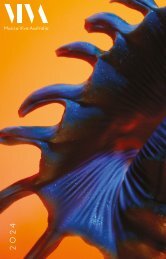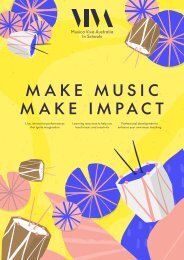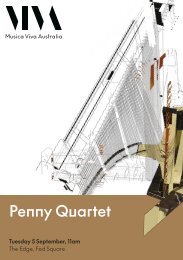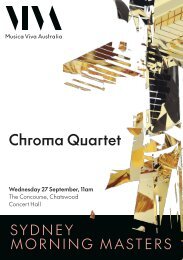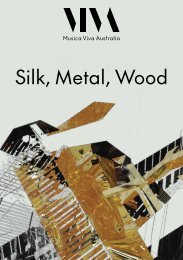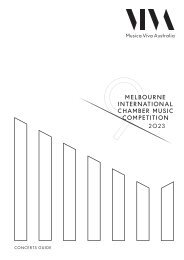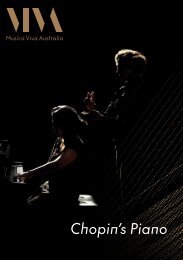You also want an ePaper? Increase the reach of your titles
YUMPU automatically turns print PDFs into web optimized ePapers that Google loves.
<strong>Vision</strong><br />
<strong>String</strong> <strong>Quartet</strong>
2
We acknowledge the Traditional Custodians of the many lands on which we meet, work and live,<br />
and we pay our respects to Elders past and present – people who have sung their songs, danced their<br />
dances and told their stories on these lands for thousands of generations, and who continue to do so.<br />
VISION STRING QUARTET<br />
FLORIAN<br />
WILLEITNER<br />
violin<br />
DANIEL<br />
STOLL<br />
violin<br />
SANDER<br />
STUART<br />
viola<br />
LEONARD<br />
DISSELHORST<br />
cello<br />
ADELAIDE<br />
Adelaide Town Hall<br />
Thursday 12 October, 7.30pm<br />
• Pre-concert talk: 6.45pm,<br />
Prince Alfred Room<br />
BRISBANE<br />
Conservatorium Theatre,<br />
Griffith University, South Bank<br />
Tuesday 26 <strong>September</strong>, 7pm<br />
Recorded for broadcast by 4MBS<br />
• Pre-concert talk: 6.15pm, Boardroom,<br />
Qld Conservatorium, Griffith University<br />
• Meet the Artists after the concert<br />
CANBERRA<br />
Llewellyn Hall,<br />
ANU School of Music<br />
Thursday 5 October, 7pm<br />
• Pre-concert talk: 6.15pm,<br />
Larry Sitsky Recital Room<br />
MELBOURNE<br />
Elisabeth Murdoch Hall,<br />
Melbourne Recital Centre<br />
Saturday 23 <strong>September</strong>, 7pm<br />
• Pre-concert talk: 6.15pm,<br />
Salzer Suite, Level 2<br />
Tuesday 10 October, 7pm<br />
• Pre-concert talk: 6.15pm,<br />
Salzer Suite, Level 2<br />
• Meet the Artists after the concert<br />
NEWCASTLE<br />
City Hall<br />
Thursday 21 <strong>September</strong>, 7.30pm<br />
• Pre-concert talk: 6.45pm,<br />
Mulubinba Room<br />
• Meet the Artists after the concert<br />
PERTH<br />
Perth Concert Hall<br />
Monday 2 October, 7.30pm<br />
Recorded for broadcast by ABC Classic<br />
• Pre-concert talk: 6.45pm,<br />
Corner Stage Riverside, Terrace Level<br />
• Meet the Artists after the concert<br />
SYDNEY<br />
City Recital Hall<br />
Saturday 7 October, 2pm<br />
• Pre-concert talk: 1.15pm,<br />
Function Room, Level 1<br />
• Meet the Artists after the concert,<br />
Concert Hall<br />
Monday 9 October, 7pm<br />
Ken Tribe Tribute Concert<br />
• Pre-concert talk: 6.15pm,<br />
Function Room, Level 1<br />
• CD signing after the concert,<br />
Main Foyer<br />
—<br />
With special thanks to the Producers’ Circle<br />
and Amadeus Society for their support of<br />
the <strong>2023</strong> Concert Season.<br />
01
From the Artistic Director<br />
© Darren Leigh Roberts<br />
The concert that clinched the <strong>Vision</strong> <strong>String</strong><br />
<strong>Quartet</strong> first prize in the 2016 Geneva<br />
International Music Competition included a<br />
blistering performance of Bartók’s fifth quartet<br />
from memory, no safety net in place. It is a<br />
staggeringly mature and confident showing, the<br />
lyrical second movement seeming to stop time.<br />
From this performance, this competition success,<br />
one would have expected the <strong>Quartet</strong> to follow<br />
a familiar trajectory: concert tours taking in<br />
Baden-Baden, Hamburg and Wigmore Hall;<br />
appearances at the great summer festivals;<br />
recordings and residencies. The <strong>Quartet</strong> has<br />
done all this, in spades, yet it is the unquenched<br />
curiosity of these four musicians about the future<br />
of the genre as much as its past that makes<br />
them stand out. They are driven by a sense of<br />
exploration and humour, almost as if learning<br />
some of the most difficult pieces in the repertory<br />
by rote is the very least audiences should expect<br />
from a quartet, the lowest of bars for them to<br />
step over with such casual virtuosity.<br />
Intimacy and energy characterise their<br />
performances, and the sense of exploration<br />
and humour that first drew them to my attention<br />
make me excited about the future of this most<br />
precious genre, the string quartet. It’s a thrill to<br />
welcome Florian, Daniel, Sander and Leonard<br />
to Australia for the first time.<br />
Paul Kildea<br />
Artistic Director<br />
02
<strong>Program</strong><br />
Ernest BLOCH (1880–1959)<br />
Prelude, B. 63 (1925)<br />
5 min<br />
Béla BARTÓK (1881–1945)<br />
<strong>String</strong> <strong>Quartet</strong> No. 4 in C major, Sz. 91 (1928)<br />
26 min<br />
I<br />
II<br />
III<br />
IV<br />
V<br />
Allegro (Fast)<br />
Prestissimo, con sordino (Extremely quick, with mutes)<br />
Non troppo lento (Not too slow)<br />
Allegretto pizzicato (Fairly fast, plucked)<br />
Allegro molto (Very fast)<br />
INTERVAL<br />
Antonín DVOŘÁK (1841–1904)<br />
<strong>String</strong> <strong>Quartet</strong> No. 13 in G major, Op. 106 (1895)<br />
37 min<br />
I<br />
II<br />
III<br />
IV<br />
Allegro moderato (Moderately fast)<br />
Adagio ma non troppo (Slow but not too slow)<br />
Molto vivace (Very fast and lively)<br />
Finale. Andante sostenuto (Moving along at a walking pace, sustained)<br />
– Allegro con fuoco (Fast and fiery)<br />
Please ensure that mobile phones are turned to silent before the performance.<br />
Photography and video recording are not permitted during the performance.<br />
Further Listening<br />
As exclusive recording artists with Warner Classics, the <strong>Vision</strong><br />
<strong>String</strong> <strong>Quartet</strong> released their 2021 album Spectrum, with music<br />
that was entirely composed and produced by the quartet,<br />
together with accompanying music videos which the quartet<br />
directed, produced and curated themselves. In 2020, their<br />
debut album Memento received an Opus Klassik Award for<br />
best chamber music recording.<br />
03
S E A<br />
2<br />
O 2 4<br />
S O N<br />
LAUNCHING<br />
17 OCTOBER<br />
musicaviva.com.au<br />
It’s all about what’s in the bottle that matters;<br />
substance over style.<br />
Estate grown, made and bottled.<br />
No one could possibly care as much about our wine as we do,<br />
so no one else touches it. Year after year, we tend the same<br />
blocks of dirt, nurture the same vines and craft our wines.<br />
We strive for perfection at every step, and that’s what makes<br />
We’ve been taking orders and delivering our fine wines to<br />
homes around Australia since 1974. You won’t find our wine in<br />
bottle shops - we’ve always preferred to cut out the middle<br />
man.<br />
If you’re in Mudgee, come and see us at our stunning cellar<br />
door, try our award winning wines and enjoy the beautiful<br />
gardens and grounds.<br />
641 ULAN ROAD BUCKAROO NSW 2850 | WWW.HUNTINGTONESTATE.COM.AU
Regional Touring<br />
As part of Musica Viva Australia’s Regional<br />
Touring <strong>Program</strong>, the <strong>Vision</strong> <strong>String</strong> <strong>Quartet</strong><br />
will perform in:<br />
• Mon 25 <strong>September</strong>: Hobart<br />
Hobart Town Hall, Tasmania<br />
• Sat 30 <strong>September</strong>: Tyalgum<br />
Tyalgum Music Festival<br />
—<br />
For further details visit:<br />
musicaviva.com.au/regional<br />
Masterclasses<br />
The following masterclasses are<br />
presented as part of this tour:<br />
• Thu 28 <strong>September</strong>: Brisbane<br />
University of Queensland<br />
(closed to public)<br />
• Mon 2 October: Perth<br />
University of Western Australia,<br />
Eileen Joyce Studio<br />
• Fri 6 October: Canberra<br />
Australian National University<br />
• Mon 9 October: Sydney<br />
Sydney Conservatorium of Music<br />
• Wed 11 October: Melbourne<br />
— Florian Willeitner<br />
Monash University<br />
(closed to public)<br />
• Wed 11 October: Melbourne<br />
Victorian College of the Arts<br />
Secondary School<br />
(closed to public)<br />
—<br />
For further details visit:<br />
musicaviva.com.au/masterclasses<br />
Musica Viva Australia’s Masterclass<br />
program is supported by:<br />
Nicholas Callinan AO & Elizabeth Callinan<br />
Caroline & Robert Clemente<br />
Ian Frazer AM & Caroline Frazer<br />
Patricia H Reid Endowment Fund<br />
Andrew Sisson AO & Tracey Sisson<br />
Mick & Margaret Toller<br />
Anonymous (2)<br />
Musica Viva Australia Masterclasses in Western<br />
Australia are supported by Wesfarmers Arts.<br />
Anneleen Lenaerts at Sydney Conservatorium of Music<br />
© Sean Moloney<br />
Zoe Knighton at Queensland Conservatorium, Griffith University<br />
© Janet McKay<br />
Timothy Ridout at Sydney Conservatorium of Music<br />
© Sean Moloney<br />
05
<strong>Vision</strong> <strong>String</strong> <strong>Quartet</strong><br />
© Harald Hoffman<br />
06
Founded in 2012, the <strong>Vision</strong> <strong>String</strong> <strong>Quartet</strong> has<br />
already established itself as one of the finest<br />
young string quartets of its generation, with a<br />
unique versatility that focuses on the classical<br />
string quartet repertoire alongside their own<br />
compositions in other disparate genres such as<br />
folk, pop, rock, funk and minimalist music. The<br />
four young musicians from Berlin who identify<br />
as much as a ‘band’ as a ‘string quartet’ are<br />
on a mission to re-address, with integrity, how<br />
classical music is presented and perceived by<br />
both new and traditional audiences.<br />
The quartet experiments with concert formats<br />
that challenge perceived expectations<br />
whilst being true to their vision of the music.<br />
Performances have included Schubert’s<br />
Death and the Maiden quartet performed<br />
in complete darkness, Beethoven’s <strong>Quartet</strong><br />
in A minor, Op 132 from memory, and<br />
experimenting with lighting designers to<br />
give further creative dimensions to their<br />
performances. Breaking new ground, they<br />
have brought these ideas to leading classical<br />
concert halls such as the Elbphilharmonie<br />
Hamburg, Berlin Philharmonic, Gewandhaus<br />
Leipzig, Oji Hall Tokyo, Philharmonie<br />
Luxembourg and London’s Wigmore<br />
Hall. Festival appearances include the<br />
Mecklenburg-Vorpommern Festival, Rheingau<br />
Music Festival, Schleswig-Holstein Music<br />
Festival, Trondheim Chamber Music Festival<br />
and the Lucerne Festival.<br />
The quartet has achieved many other notable<br />
prizes in international competitions such as the<br />
2016 Felix Mendelssohn Bartholdy Competition<br />
in Berlin and the 2016 Concours de Génève.<br />
Testament to their charisma as well as their<br />
musicianship, not only did they receive First<br />
Prize in both of these, but all the audience and<br />
special prizes too. The Ritter Prize from the<br />
Oscar and Vera Ritter Foundation followed in<br />
2021, as well as the Jürgen Ponto Foundation's<br />
Chamber Music Prize (2018) and the Würth<br />
Prize (2016).<br />
Recent highlights have included tours to<br />
both the USA and Japan, with performances<br />
in New York, Toronto, Chicago, Tokyo<br />
and Kyoto. Highlights of the 21/22 season<br />
included appearances in Germany, Italy,<br />
Austria, Switzerland, Denmark, Bulgaria<br />
and Norway as well as the world premiere<br />
of Thorsten Encke’s concerto for string<br />
quartet and orchestra, technologia, with<br />
the Konzerthausorchester Berlin. In 22/23<br />
they have been Artists in Residence at the<br />
Beethovenfest in Bonn and the Bodensee<br />
Festival at Lake Constance, and toured Japan,<br />
South Korea, Mexico and South America.<br />
The <strong>Quartet</strong> completed their chamber<br />
music studies with the Artemis <strong>Quartet</strong> at<br />
the University of the Arts in Berlin and with<br />
Günter Pichler of the Alban Berg <strong>Quartet</strong> at<br />
the Escuela Superior de Música Reina Sofía<br />
in Madrid. In addition, they have received<br />
tuition from teachers such as Heime Müller,<br />
Eberhardt Feltz and Gerhard Schulz, as well<br />
as participating in masterclasses at Jeunesses<br />
Musicales, Pro<strong>Quartet</strong> in France and the<br />
Foundation Villa Musica Rheinland-Pfalz<br />
where they were scholarship holders.<br />
The <strong>Vision</strong> <strong>String</strong> <strong>Quartet</strong> performs with kind<br />
support from the Deutscher Musikrat (German<br />
Music Council) and is thrilled to endorse<br />
Thomastik-Infeld strings.<br />
© Sander Stuart<br />
07
About the music<br />
Swiss-born composer and conductor<br />
Ernest Bloch emigrated to the United<br />
States in 1916, following a tour of the States<br />
with the Canadian dancer Maud Allen.<br />
Bloch conducted the 40-piece orchestra<br />
that accompanied Allen on the tour; a<br />
contemporary review described him as ‘a<br />
conductor of strong, virile personality’.<br />
cornerstone. While some of Bloch’s other works<br />
of this period explored quarter tones and other<br />
extended techniques, this one is simpler –<br />
short, sweet, and an ideal concert-opener.<br />
© LUKE IREDALE <strong>2023</strong><br />
In the late 1920s, Béla Bartók was living in<br />
Budapest, and was starting to be known all<br />
over the world. Despite this fame, however, he<br />
remained an intensely private and introverted<br />
person. He was not fond of teaching or<br />
performing, although he had to do both to<br />
support his family. He spoke and wrote very<br />
little about his own compositions, preferring to<br />
let the music represent itself. The one topic that<br />
made his eyes light up was the collection and<br />
study of folk music – Hungarian, Romanian,<br />
Bulgarian and even Arabian – that had<br />
occupied him from his youth and continued to<br />
be central to his life. To Bartók’s thinking, folk<br />
music was of more than scientific interest: it<br />
was the life-giving seed without which there<br />
was no way forward in musical creation.<br />
His ideal was to internalise the rhythms and<br />
contours of the folk melodies he collected, to<br />
a point where his own compositions were the<br />
natural result.<br />
Despite good reviews, the touring company<br />
eventually went bankrupt, after which Bloch<br />
elected to remain in the US, taking on a variety<br />
of teaching positions in the ensuing decades.<br />
The Prelude for string quartet of 1925 came<br />
during Bloch’s transition from the Cleveland<br />
Institute of Music to the San Francisco<br />
Conservatory. Subtitled Recueillement<br />
(‘contemplation’), it is richly suffused with<br />
post-Romantic passion and adventurous 20thcentury<br />
harmony; European-meets-American,<br />
like the composer himself. The sighing<br />
theme first heard on the viola is the work’s<br />
He composed his Fourth <strong>Quartet</strong> in 1928.<br />
Everything about the piece betrays Bartók’s<br />
obsession with mirror-images and symmetry,<br />
a hallmark of his mature style. In every<br />
movement one hears a melody in one voice<br />
answered by the same melody upside-down in<br />
another voice. There are abundant examples<br />
of a motif answered by its duplicate on a<br />
different pitch. Once in a while a melody is<br />
even replied to by its retrograde: the same<br />
melody played backwards. These contrapuntal<br />
games are hardly unique to Bartók, but he<br />
saturated this music with them to an unusual<br />
extent.<br />
08
The entire, five-movement layout of the quartet<br />
is symmetrical as well. Bartók cast the piece<br />
in an arch form, coupling the first movement<br />
with the fifth movement, the second with the<br />
fourth, and the third movement standing alone<br />
as the work’s solitary capstone. The paired<br />
movements share various characteristics: basic<br />
soundscape, motivic material, and emotional<br />
heft.<br />
is a charming, somewhat rustic tableau where<br />
the quartet plays only pizzicato. We seem to<br />
have stumbled across a village scene where<br />
a band of four balalaika players (or perhaps<br />
cimbaloms) are entertaining the locals. The<br />
strings are often strummed back and forth,<br />
guitar-like, and sometimes snapped harshly<br />
against the fingerboard: the ‘Bartók pizzicato’.<br />
The outer movements are lively, energetic<br />
and bold. The first develops its material in an<br />
orderly and considered fashion; one might<br />
even say that it is forbiddingly heavy in its<br />
dense textures and its forests of semitones. At<br />
the same time, it has enormous energy: with<br />
every imitation, every reflected melody, every<br />
exclamatory chord, one hears the verve of<br />
new creation, of musical DNA being mapped<br />
and remapped. Central to the movement is a<br />
galloping six-note idea, three rising chromatic<br />
notes followed by three faster falling ones. This<br />
‘motto’ returns in the last movement and binds<br />
the piece together.<br />
The fifth movement is a rugged, stamping folk<br />
dance. The main melody is a simple, primal<br />
idea that goes up and down four notes of<br />
an exotic scale. The accompanying rhythms<br />
recall those of Stravinsky’s Rite of Spring;<br />
undoubtedly Bartók sought here to evoke a<br />
rustic, vital energy of his own. In the quieter<br />
central episode, the galloping motto idea from<br />
the first movement sneaks back in, starting<br />
in the cello part. The main material from the<br />
finale returns to do battle with this intruder,<br />
and they vie to the end of the movement, but<br />
the motto theme gets the last word.<br />
The second and fourth movements are lighter<br />
scherzo movements. The second is muted,<br />
weightless and fleet, a four-way game of<br />
Catch on fast-forward. Striking effects abound:<br />
glissandi that smear the canvas, the glassy<br />
sound of ponticello (playing near the bridge),<br />
harmonics and pizzicati. The fourth movement<br />
The third movement is night music, solitary and<br />
mournful. A chord fades in, note by note, at<br />
the beginning, and becomes a backdrop for<br />
a melody in the cello part which sings, weeps<br />
and yodels, questing ever upward through<br />
three ascending verses.<br />
© MISHA AMORY<br />
09
Antonín Dvořák, a professional viola<br />
player, wrote chamber music throughout<br />
his life; his first official opus was a twoviola<br />
string quintet written when he was 20,<br />
closely followed by his first string quartet.<br />
Over the next 34 years he composed 14<br />
string quartets, three string quintets and a<br />
sextet as well as piano trios, quartets and<br />
quintets.<br />
Between his eleventh quartet in 1881 and his<br />
twelfth quartet (the well-known 'American')<br />
there is a twelve-year gap. This was the<br />
time when his international reputation<br />
grew, thanks mainly to appreciative British<br />
audiences – he made five extended<br />
trips to England between 1884 and 1886.<br />
Their admiration for his work, and lack<br />
of prejudice against his native folk music,<br />
gave him the freedom to develop his own<br />
musical style. The interest of the Novellos in<br />
publishing his music also gave him welcome<br />
leverage to secure increased fees from his<br />
long-standing publisher Simrock – he had<br />
six children to maintain.<br />
His visits to England were interrupted<br />
by Mrs Jeanette Thurber's invitation to<br />
be artistic director of her new National<br />
Conservatory of Music in America,<br />
based in New York. Her aim, to which<br />
Dvořák was sympathetic, was to develop<br />
a national American style of art music.<br />
Dvořák immersed himself in spirituals<br />
and plantation songs from the South, and<br />
transcriptions of Amerindian melodies.<br />
During his stay in America, Dvořák returned<br />
to quartet writing with what was to be his<br />
best-known quartet, the ‘American’.<br />
The G major quartet in this program, his<br />
thirteenth, was written at the end of 1895<br />
soon after his return home from America.<br />
The raw material, presented at the<br />
beginning, is rhythmic and episodic rather<br />
than melodic, with each of the first four bars<br />
containing a different motif; however, these<br />
motifs are soon transformed into a confident<br />
risoluto (resolute) theme. It contrasts with a<br />
more tender triplet-based second subject,<br />
which will reappear in the last movement.<br />
The Adagio has a dark, melancholy, Slavic<br />
theme, introduced by the violin and repeated<br />
throughout the movement in a variety of<br />
different moods and keys. Dvořák’s good<br />
cheer returns in the Scherzo. In the first of its<br />
two trios the violin echoes a gentle theme from<br />
the viola.<br />
A brief Andante introduces the theme of the<br />
final Allegro con fuoco. The Andante returns<br />
to introduce the middle section, which is<br />
a meditation on the second subject of the<br />
first movement. Other elements from that<br />
movement also contribute, including the<br />
tumbling triplets of the opening third bar. The<br />
movement's main Allegro theme returns and<br />
after some characteristic Dvořák sliding keychanges<br />
we romp to the finish.<br />
ADAPTED FROM A NOTE © CHRIS DARWIN<br />
10
DISCOVER THE ALBUM HERE<br />
Melbourne’s Finest<br />
Afternoon Tea Experience<br />
Discover The Langham Afternoon Tea at Aria Bar & Lounge and<br />
indulge in a selection of British tea time classics with a modern twist.<br />
#LovingLangham #CelebrateTheEveryday<br />
1 Southgate Avenue, Southbank, Vic 3006 Australia<br />
T (61) 8696 8888 F (61) 9690 5889<br />
langhamhotels.com/melbourne
Hands up!<br />
…if you know over 90% of Musica Viva Australia audiences are under 15?<br />
—<br />
Every year we present over 1,000 performances<br />
to more than 150,000 students live in schools across Australia.<br />
—<br />
Throughout 2024 there will be drumming, dancing and musical fun for students,<br />
supported by online resources and a parallel program of<br />
Professional Development for teachers.<br />
If you or someone you know is interested in finding out more<br />
about Musica Viva Australia In Schools:<br />
or<br />
VISIT<br />
SIGN-UP<br />
STRIKE A CHORD 2O24<br />
Musica Viva Australia’s national chamber music competition for high<br />
school musicians is back in 2024. Do you know any secondary school<br />
students who have a passion for music? The Strike A Chord competition<br />
provides training and performing opportunities to young performers<br />
of all levels to develop their ensemble skills, fostering participation<br />
and a lifelong love of music. It’s more fun playing together!<br />
DETAILS
2O24 PROGRAM OUT NOW<br />
MAKE MUSIC<br />
MAKE IMPACT<br />
Explore Musica Viva Australia In Schools:<br />
live and interactive in school performances that ignite imagination.<br />
musicaviva.com.au/education
Interview<br />
BY STEPHANIE ESLAKE<br />
Repeat.<br />
Repeat.<br />
'Repeat. Repeat.<br />
As concertgoers, we feel a profound sense of<br />
awe when we watch a musician performing<br />
from memory.<br />
Sometimes they’ll close their eyes and allow<br />
the music to immerse them; other times, they’ll<br />
glance around to their performance partners,<br />
giving cues through human connection in<br />
lieu of notes on the page. We marvel at the<br />
spectacle of a player who exhibits technical<br />
skill and stirring expression – all without<br />
missing a note.<br />
It’s common to experience this feeling when<br />
watching a soloist who has memorised a<br />
concerto. Less often do we have the chance<br />
to see a chamber ensemble filled with four<br />
virtuosic musicians, equally talented at their<br />
instruments, all playing their parts from<br />
memory while creating a unified sound. A<br />
sound that identifies them as a group – in this<br />
case, as the <strong>Vision</strong> <strong>String</strong> <strong>Quartet</strong>.<br />
When asked how the players prepare to<br />
tour a full concert program from memory,<br />
violinist Daniel Stoll offers a surprisingly simple<br />
response: ‘Repeat. Repeat. Repeat.’ In fact,<br />
he goes on to repeat this word a further 23<br />
times (once interjecting the word ‘sleep’ in the<br />
middle of the list). Though it’s safe to assume a<br />
far greater number of repetitions take place in<br />
the practice room.<br />
The <strong>Vision</strong> <strong>String</strong> <strong>Quartet</strong>’s decision to play<br />
everything from memory arose during a<br />
masterclass – ‘one unforgettable day’ in<br />
southern Germany. Cellist Leonard Disselhorst<br />
recalls how the group was practising Debussy’s<br />
string quartet, and could hear another<br />
ensemble playing the same music through the<br />
walls.<br />
‘Without glancing at the score, we instinctively<br />
joined in, and successfully managed to<br />
navigate through the entire piece,’ Leonard<br />
shares. ‘This experience led us to embrace<br />
the challenge of performing from memory – a<br />
decision we carried forward to our very first<br />
concert.’<br />
The choice has flow-on effects: without sheet<br />
music, there’s no need for music stands – so<br />
why bother sitting in a standard configuration?<br />
‘The decision to play from memory naturally<br />
led to the choice of standing up, and since<br />
then, we have all mostly grown accustomed<br />
to this approach,’ Leonard says. (With the<br />
exception of the cellist, of course.)<br />
It may sound like a logistical decision, but<br />
it’s one that enhances the impact of their<br />
performance. They’re not rigidly confined to<br />
their seats: we can watch the four become<br />
unleashed with the music, playing it with their<br />
whole bodies.<br />
14
Repeat.'<br />
As violinist Florian Willeitner explains, it’s not<br />
just for show: ‘Playing from memory allows<br />
you to connect even deeper with the musical<br />
flow. You listen and play differently. There is an<br />
additional layer of excitement when you play<br />
by heart, which forces you to be into the music<br />
100 per cent, all the time.’<br />
Without music stands, there is no physical<br />
barrier between audience and performer. And<br />
this too speaks to the ethos of the <strong>Vision</strong> <strong>String</strong><br />
<strong>Quartet</strong> and the way these players represent<br />
what they’re about, which may be unlike the<br />
other ensembles you’ve come across. They like<br />
to describe their group as a ‘band’. In group<br />
photos, they dress traditionally in the colour of<br />
concert blacks – but they may be standing in a<br />
pastel pink ball pit.<br />
Their Warner Classics album Spectrum was<br />
so tailored to their ideas about how chamber<br />
music can be presented that it was entirely<br />
composed, performed and produced by the<br />
group – and they directed their own film clips,<br />
too.<br />
‘We want to show our audience that chamber<br />
music – and especially a string quartet – is<br />
not necessary four serious conservative<br />
[musicians],’ Daniel says. They make a point of<br />
their music being for anyone and everyone –<br />
no matter how old or new their repertoire.<br />
In this Musica Viva Australia tour, the artists<br />
present a series of invigorating, complex and<br />
emotive works. ‘We searched for a program<br />
which is full of contrasts,’ Daniel says.<br />
Their insights as composers of new music has<br />
paved the way for a deep level of respect<br />
when interpreting older works, too. ‘We find it<br />
very important to really get into a music style<br />
or genre with all its specifications and details<br />
before going on stage,’ Daniel says.<br />
To this the musicians bring their own emotional<br />
responses to the repertoire. ‘I personally love<br />
Dvořák, says Florian, ‘because it feels very<br />
much like home for me. Dvořák was born in<br />
Bohemia not far from where I grew up, so I am<br />
very familiar with the landscapes – beautiful<br />
soft green hills, and endless forests – and the<br />
folk music Dvořák was influenced by.’<br />
The Bartók quartet was also influenced by folk<br />
music, Florian says. ‘We love to play folk music<br />
and include elements of it into our own pieces<br />
as well, which is why we feel very close to this<br />
repertoire.’<br />
Of course, the Berlin-based group have their<br />
own ideas about what it means to take this<br />
European music on their international tour.<br />
‘We are eagerly anticipating the opportunity<br />
to travel to the far reaches of the world,<br />
and perform in the land of kangaroos and<br />
untamed creatures,’ Leonard says with a smile.<br />
But on a more serious note, he adds: ‘The<br />
prospect of connecting with our Australian fan<br />
community is exhilarating. This tour marks<br />
a significant milestone for us, and we are<br />
deeply humbled to be a part of the Musica<br />
Viva Australia season. We are dedicated to<br />
bringing a fresh perspective to the chamber<br />
music scene in Australia, and making a<br />
positive impact.’<br />
15
ENSEMBLE<br />
PATRONS<br />
+<br />
CONCERT<br />
CHAMPIONS<br />
For nearly 80 years Musica Viva Australia has delivered tours of the highest calibre<br />
in concert halls throughout the country. At the heart of our touring program are our<br />
generous Ensemble Patrons and Concert Champions, whose extraordinary vision<br />
of supporting the finest possible Australian and international artists has<br />
enriched the lives of music lovers through live performance and online.<br />
Thank you for everything you do.<br />
For information about our Ensemble Patrons and Concert Champions programs, please contact:<br />
Zoë Cobden-Jewitt, Director of Development<br />
zcobden-jewitt@musicaviva.com.au<br />
0409 340 240
Patrons<br />
CUSTODIANS<br />
ACT Margaret Brennan, Clive & Lynlea Rodger,<br />
Ruth Weaver, Anonymous (4)<br />
NSW Catherine Brown-Watt PSM & Derek Watt,<br />
Jennifer Bott AO, Lloyd & Mary Jo Capps AM, Andrew &<br />
Felicity Corkill, Peter Cudlipp, Liz Gee, Suzanne Gleeson,<br />
David & Christine Hartgill, Annie Hawker, Elaine Lindsay,<br />
Trevor Noffke, Dr David Schwartz, Ruth Spence-Stone,<br />
Mary Vallentine AO, Deirdre Nagle Whitford, Richard<br />
Wilkins, Kim Williams AM, Megan & Bill Williamson,<br />
Ray Wilson OAM, Anonymous (12)<br />
QLD Anonymous (2)<br />
SA Monica Hanusiak-Klavins & Martin Klavins,<br />
Anonymous (4)<br />
TAS<br />
Kim Paterson QC, Anonymous<br />
VIC Elizabeth & Anthony Brookes, Julian Burnside AO<br />
QC, Ms Helen Dick, Robert Gibbs & Tony Wildman, Helen<br />
Vorrath, Anonymous (8)<br />
WA Graham Lovelock, Anonymous (4)<br />
LEGACY DONORS<br />
ACT<br />
The late Geoffrey Brennan<br />
NSW The late Charles Berg, The late Stephen Center,<br />
The late Janette Hamilton, The late Dr. Ralph Hockin in<br />
memory of Mabel Hockin, The late Geraldine Kenway,<br />
The late Kenneth W Tribe AC<br />
QLD<br />
The late Steven Kinston<br />
SA The late Edith Dubsky, In memory of Helen Godlee,<br />
The late John Lane Koch, The late Lesley Lynn<br />
VIC In memory of Anita Morawetz, The family of<br />
the late Paul Morawetz, The late Dr G D Watson<br />
WA<br />
Anonymous<br />
CONCERT CHAMPIONS<br />
The mainstage concerts of our <strong>2023</strong> Season are brought<br />
to life thanks to the generosity of our Concert Champions<br />
around the country.<br />
Adelaide Helen Bennetts & Tim Lloyd, The late Lesley Lynn,<br />
Dr Susan Marsden & Michael Szwarcbord, Leonie Schmidt<br />
& Michael Davis, Anonymous (2)<br />
Brisbane Ian & Cass George, Andrea & Malcolm Hall-Brown,<br />
Andrew & Kate Lister, Barry & Diana Moore, Anonymous (2)<br />
Canberra Andrew Blanckensee Music Lover, Professor<br />
Malcolm Gillies & Dr David Pear, Sue & Ray Edmondson,<br />
Claudia Hyles, Margaret Lovell & Grant Webeck,<br />
Ruth Weaver & Anonymous, Dr Suzanne Packer,<br />
Sue Terry & Len Whyte<br />
Melbourne Alexandra Clemens & Bibi Aickin, Penelope<br />
Hughes, Peter Lovell, The Morawetz Family in memory of<br />
Paul Morawetz, Dr John Tang, Dr Michael Troy, Ray Turner<br />
& Jennifer Seabrook, Mark & Suzy Suss in memory of<br />
Dr James Pang, The late Dr G D Watson, Dr Victor Wayne &<br />
Dr Karen Wayne OAM, Igor Zambelli<br />
Newcastle Judith Bennett, Gabrielle Bookallil &<br />
The Musica Viva Australia Newcastle Committee,<br />
Megan & Bill Williamson<br />
Perth Dr Robert Larbalestier AO, Deborah Lehmann AO<br />
& Michael Alpers AO, Prichard Panizza Family (2),<br />
For Stephanie Quinlan (2), Valerie & Michael Wishart<br />
Sydney Judith Bennett, Patricia Crummer, Pam Cudlipp,<br />
Dr Jennifer Donald & Mr Stephen Burford, Charles Graham<br />
– in acknowledgement of his piano teacher, Sana Chia,<br />
Katherine & Reg Grinberg, Anthony Strachan, Tribe Family,<br />
Kay Vernon, Kim Williams AM & Catherine Dovey (2)<br />
PRODUCERS’ CIRCLE<br />
Darin Cooper Foundation, Peter Griffin AM & Terry Swann<br />
ENSEMBLE PATRONS<br />
Our artistic vision for <strong>2023</strong> is made possible thanks to<br />
the extraordinary generosity of our Ensemble Patrons,<br />
each of whom supports the presentation of an entire<br />
national tour for our <strong>2023</strong> Season.<br />
Ian & Caroline Frazer (Karin Schaupp & Flinders <strong>Quartet</strong>)<br />
Ian Dickson AM & Reg Holloway and Anonymous<br />
(The Cage Project)<br />
Stephen & Michele Johns & Anonymous (Chopin’s Piano)<br />
Eleanore Goodridge OAM (Wildschut & Brauss)<br />
AMADEUS SOCIETY<br />
Tony Berg AM & Carol Berg, Marc Besen AC & Eva Besen AO<br />
dec., Tom Breen & Rachael Kohn AO, Dr Di Bresciani OAM,<br />
Ms Annabella Fletcher, Dr Annette Gero, Katherine &<br />
Reg Grinberg, Jennifer Hershon, Fred & Claire Hilmer,<br />
Penelope Hughes, Michael & Frédérique Katz, Ruth Magid<br />
& Bob Magid OAM, Dr Hadia Mukhtar, Prof. John Rickard,<br />
Philip Robinson, Andrew Rosenberg, Ray Wilson OAM<br />
17
MASTERCLASSES<br />
GIVING CIRCLE<br />
The Masterclasses Giving Circle is a group of generous<br />
donors whose collective support will enable the artistic<br />
development of the next generation of Australian<br />
chamber musicians.<br />
Nicholas Callinan AO & Elizabeth Callinan, Caroline &<br />
Robert Clemente, Patricia H. Reid Endowment Fund,<br />
Andrew Sisson AO & Tracey Sisson, Mick & Margaret<br />
Toller, Anonymous<br />
COMMISSIONS<br />
Musica Viva Australia is proud to support the creation<br />
of new Australian works through The Ken Tribe Fund<br />
for Australian Composition and The Hildegard Project.<br />
We are grateful to the following individuals and<br />
collectives for their generous support of this work:<br />
In loving memory of Jennifer Bates, Christine Bollen &<br />
Friends, Stephen Johns for his wife Michele,<br />
The Barry Jones Birthday Commission, DR & KM Magarey,<br />
Naomi Milgrom Foundation & Ian Dickson AM &<br />
Reg Holloway, Playking Foundation, Tribe Family<br />
in honour of Doug Tribe’s 75th Birthday, Adelaide<br />
Commissioning Circle, Perth Commissioning Circle<br />
The Barry Jones Birthday Commission ($500+)<br />
Steve Bracks AC & Terry Bracks AM, Dr George Deutsch<br />
OAM & Kathy Deutsch, Carrillo Gantner, Professor<br />
Margaret Gardner AC & Professor Glyn Davis AC,<br />
Naomi & George Golvan QC, Hon David Harper AM,<br />
Ellen Koshland & James McCaughey, Miles Lewis, Julie &<br />
Ian Macphee, Barry McGaw, Jeannette McHugh, Fiona<br />
McLeod AO SC, Peter & Ruth McMullin, peckvonhartel<br />
architects, Ralph & Ruth Renard, Anne & Robert Richter<br />
QC, Gianna Rosica, Joy Selby Smith, Smith Family,<br />
Maureen & Tony Wheeler, Lyn Williams, Dr Robyn<br />
Williams AO, Bob, Robyn, Annie & Nick, Anonymous (3)<br />
MAJOR GIFTS<br />
$100,000+<br />
NSW The Berg Family Foundation,<br />
Patricia H. Reid Endowment Fund, Anonymous<br />
$50,000+<br />
ACT<br />
Marion & Michael Newman<br />
NSW J A Donald Family, Katherine & Reg Grinberg,<br />
Tom & Elisabeth Karplus<br />
$20,000+<br />
NSW Michael & Frédérique Katz, Vicki Olsson<br />
QLD<br />
Ian & Caroline Frazer, Andrea & Malcolm Hall-Brown<br />
VIC The Morawetz Family in memory of Paul Morawetz,<br />
Marjorie Nicholas OAM, Anonymous<br />
WA<br />
$10,000+<br />
ACT<br />
Anonymous<br />
R & V Hillman, Mick & Margaret Toller, Anonymous<br />
NSW Gardos Family, Gresham Partners, Hilmer Family<br />
Endowment, Ian Dickson & Reg Holloway, Mrs W G<br />
Keighley, Anthony Strachan, Jo Strutt, Ray Wilson OAM<br />
QLD<br />
Anonymous<br />
SA Jennifer & John Henshall, Stoneglen Foundation,<br />
Anonymous<br />
VIC Roger Druce & Jane Bentley, Peter Lovell,<br />
In Memory of Dr Ian Marks, Mercer Family Foundation,<br />
Anonymous<br />
WA Legacy Unit Trust, Deborah Lehmann AO<br />
& Michael Alpers AO<br />
$5,000+<br />
ACT Goodwin Crace Concertgoers, Craig Reynolds,<br />
Sue Terry & Len Whyte<br />
NSW Christine Bishop, Tom Breen & Rachael Kohn AO,<br />
Patricia Crummer, Sarah & Tony Falzarano, Katherine &<br />
Reg Grinberg, David & Carole Singer, Diane Sturrock,<br />
Richard Wilkins, Kim Williams AM & Catherine Dovey<br />
QLD<br />
SA<br />
Anonymous<br />
Aldridge Family Endowment, Anonymous<br />
VIC In memory of Kate Boyce, Dr Di Bresciani OAM<br />
& Lino Bresciani, Julian Burnside AO KC & Kate Durham,<br />
William J Forrest AM, Leanne Menegazzo, Joy Selby Smith,<br />
Greg Shalit & Miriam Faine, Musica Viva Australia Victorian<br />
Committee MICMC Prize, Bruce Missen, Anonymous<br />
WA David Wallace & Jamelia Gubgub, Zoe Lenard &<br />
Hamish Milne, Anonymous<br />
18
ANNUAL GIFTS<br />
$2,500+<br />
ACT Kristin van Brunschot & John Holliday,<br />
Dr Andrew Singer, Anonymous<br />
NSW ADFAS Newcastle, Penny Beran, Susan Burns,<br />
Hon. Professor Ross Steele AM<br />
SA<br />
DJ & EM Bleby<br />
VIC Jan Begg, Alastair & Sue Campbell, Anne<br />
Frankenberg & Adrian McEniery, Lyndsey & Peter Hawkins,<br />
Michael Nossal & Jo Porter, Ralph & Ruth Renard,<br />
Maria Sola, Wendy R. Taylor, Helen Vorrath, Igor Zambelli<br />
WA<br />
$1,000+<br />
Ros Kesteven, Mrs Morrell, Anonymous<br />
ACT Andrew Blanckensee, The Breen/Dullo Family,<br />
Odin Bohr & Anna Smet, Dudley & Helen Creagh,<br />
Martin Dolan, Liz & Alex Furman, Kingsley Herbert,<br />
Margaret & Peter Janssens, Margaret Oates, S Packer,<br />
Clive & Lynlea Rodger, Hannah Semler, Anonymous (4)<br />
NSW Judith Allen, David & Rae Allen, Maia Ambegaokar<br />
& Joshua Bishop, Stephen Booth, Jennifer Bott AO,<br />
Vicki Brooke, Neil Burns, Hugh and Hilary Cairns,<br />
Hon J C Campbell QC & Mrs Campbell, Lloyd &<br />
Mary Jo Capps AM, Richard Cobden SC, Opus 109<br />
Sub-fund, Community Impact Foundation, Robin & Wendy<br />
Cumming, Trish & John Curotta, Thomas Dent, Nancy Fox<br />
AM & Bruce Arnold, John & Irene Garran, Charles & Wallis<br />
Graham, Kate Girdwood, H2 Cairns Foundation, Annie<br />
Hawker, Robert & Lindy Henderson, Lybus Hillman, Dr Ailsa<br />
Hocking & Dr Bernard Williams, Dorothy Hoddinott AO,<br />
Catharine & Robert Kench, Kevin & Deidre McCann, DR &<br />
KM Magarey, Arthur & Elfreda Marshall, Dr Dennis Mather<br />
& John Studdert, Mora Maxwell, Professor Craig Moritz,<br />
Michael & Janet Neustein, Paul O’Donnell, Laurie Orchard,<br />
Ms Vivienne Sharpe, Dr Robyn Smiles, Tom & Dalia Stanley,<br />
Geoff Stearn, Graham & Judy Tribe, Kate Tribe, Dr Elizabeth<br />
Watson, John & Flora Weickhardt, Megan & Bill Williamson,<br />
Anonymous (6)<br />
QLD George Booker & Denise Bond, Prof. Paul & Ann<br />
Crook, Stephen Emmerson, Robin Harvey, Lynn &<br />
John Kelly, Andrew & Kate Lister, Jocelyn Luck, Barry &<br />
Diana Moore, Keith Moore, Barbara Williams &<br />
Jankees van der Have, Anonymous (2)<br />
SA Ivan & Joan Blanchard, Richard Blomfield,<br />
Max & Ionie Brennan, Peter Clifton, Elizabeth Ho OAM, in<br />
honour of the late Tom Steel, Joan Lyons, Fiona MacLachlan<br />
OAM, Dr Leo Mahar, Ruth Marshall & Tim Muecke, Geoff &<br />
Sorayya Martin, Ann & David Matison, Diane Myers,<br />
Leon Pitchon, Jennie Shaw, Anne Sutcliffe, Anonymous (3)<br />
TAS<br />
Dianne O’Toole<br />
VIC Joanna Baevski, Russ & Jacqui Bate, Marlyn Bancroft,<br />
Marc Besen AC & the late Eva Besen AO, Jannie Brown,<br />
Alison & John Cameron, Mrs Maggie Cash, Alex & Elizabeth<br />
Chernov, Kathy & George Deutsch OAM, Dhar Family,<br />
Lord Ebury, Dr Gelnys & Dr Alan French, Naomi Golvan &<br />
George Golvan KC, Virginia Henry, Doug Hooley, Helen<br />
Imber, The Hon. Dr Barry Jones AC & Ms Rachel Faggetter,<br />
Angela Kayser, Angela & Richard Kirsner, Angela Li,<br />
Janet McDonald, Ruth McNair AM & Rhonda Brown in<br />
memory of Patricia Begg & David McNair, June K Marks,<br />
Christopher Menz & Peter Rose, Traudl Moon OAM, D & F<br />
Nassau, Adrian Nye, Resonance Fund – Michael Cowen &<br />
Sharon Nathani, Barry Robbins, Murray Sandland, Ms Thea<br />
Sartori, Marshall Segan & Ylana Perlov in memory of his<br />
late parents, Gary Singer & Geoffrey Smith, Darren Taylor<br />
& Kent <strong>String</strong>er, Ray Turner & Jennifer Seabrook, Dr Victor<br />
Wayne & Dr Karen Wayne OAM, Lyn Williams, Mark &<br />
Anna Yates, Anonymous (2)<br />
WA David & Minnette Ambrose, Dr S Cherian,<br />
Michael & Wendy Davis, In memory of Raymond Dudley,<br />
Dr Penny Herbert in memory of Dunstan Herbert,<br />
Ms Helen Hollingshead, Anne Last & Steve Scudamore,<br />
Hugh & Margaret Lydon, Olivier David & Dr Bennie Ng,<br />
Marian Magee & David Castillo, John Overton, Prof Robyn<br />
Owens AM, Margaret & Roger Seares, Robyn Tamke,<br />
Anonymous (4)<br />
$500+<br />
ACT Margaret Brennan, Christine Bollen, Christopher<br />
Clarke, Peter Cumines, Susan Edmondson, Jill Fleming,<br />
Robert Hefner, Claudia Hyles OAM, Margaret Millard,<br />
Helen Rankin, Ruth Weaver, Dr Paul & Dr Lel Whitbread,<br />
Anonymous<br />
NSW Denise Braggett, Christopher & Margaret Burrell,<br />
Robert Cahill and Anne Cahill OAM, Lucia Cascone,<br />
Howard Dick, Dr Arno Enno & Dr Anna Enno, Bronwyn<br />
Evans, Anthony Gregg, The Harvey Family, Roland &<br />
Margaret Hicks, David & Sarah Howell, Alicia Howlett, In<br />
honour of Michael Katz, Cynthia Kaye, Mathilde Kearny-<br />
Kibble, Bruce Lane, Graham & Sue Lane, Olive Lawson,<br />
Trish Ludgate, Dr Colin MacArthur, Ian & Pam McGaw, Dr V<br />
Jean McPherson, Frances Muecke, Kim & Margie Ostinga,<br />
Christina Pender, Trish Richardson in memory of Andy Lloyd<br />
James, Dr John Rogers, Penny Rogers, Peter & Heather<br />
Roland, Christopher Sullivan & Jim Lennon, Kathie & Reg<br />
Grinberg – In honour of Dalia Stanley’s birthday, Beverley &<br />
Richard Taperell, Kay Vernon, Andrew Wells AM, Margaret<br />
Wright OAM, Anonymous (15)<br />
QLD Geoffrey Beames, Noela Billington, Janet Franklin,<br />
Timothy Matthies & Chris Bonnily, Anonymous<br />
SA Zoë Cobden-Jewitt & Peter Jewitt, Daniel & Susan<br />
Hains, Elizabeth Hawkins, Dr Iwan Jensen, The Hon.<br />
Christopher Legoe AO QC & Mrs Jenny Legoe,<br />
Helga Linnert & Douglas Ransom, Julie Mencel &<br />
Michael McKay, Trish Ryan & Richard Ryan AO,<br />
Tony Seymour, Anonymous (5)<br />
TAS<br />
Anonymous<br />
VIC David Bernshaw & Caroline Isakow, Coll & Roger<br />
Buckle, Pam Caldwell, John & Mandy Collins, John & Chris<br />
Collingwood, Ted & Alison Davies, Mary-Jane Gething,<br />
John & Margaret Harrison, Dr Anthea Hyslop, Eda<br />
Ritchie AM, Professor Lynne Selwood, Maureen Turner,<br />
Anonymous (8)<br />
WA Jennifer Butement, Fred & Angela Chaney, Rachel &<br />
Bruce Craven, Helen Dwyer, Dr Barry Green, Russell Hobbs<br />
& Sue Harrington, Paula Nathan AO & Yvonne Patterson,<br />
Lindsay & Suzanne Silbert, Father Richard Smith, Ruth<br />
Stratton, Christopher Tyler, Anonymous (5)<br />
19
Concert Partners<br />
Perth Concert Series Sydney Morning Masters Series Musica Viva Australia at The Edge Series<br />
Commissioning Partner (The Cage Project)<br />
Rehearsal Partner (The Cage Project)<br />
Project Partner (The Cage Project)<br />
Legal<br />
Chartered Accountants<br />
Piano & Tuning<br />
Media Partner Wine Partner act, nsw, qld, sa, vic Wine Partner wa<br />
Hotel Partner<br />
Hotel Partner<br />
Government Partners<br />
Musica Viva Australia is assisted by<br />
the Australian Government through Creative Australia,<br />
its principal arts investment and advisory body.<br />
Musica Viva Australia is supported<br />
by the NSW Government through<br />
Create NSW.<br />
Musica Viva Australia is a Not-for-profit Organisation<br />
endorsed by the Australian Taxation Office as a Deductible<br />
Gift Recipient and registered with the Australian Charities<br />
and Not-for-profits Commission (ACNC).<br />
Emerging Artists Partners<br />
Melbourne International Chamber Music Competition<br />
Principal Partner<br />
Strategic Partner<br />
Grand Prize Partner<br />
Key Philanthropic Partner<br />
FutureMakers Lead Partner FutureMakers Residency Partner Key Philanthropic Partner<br />
20
Education Partners<br />
Government Partnerships & Support<br />
National Education Supporters<br />
J A Donald Family<br />
Marion & Mike Newman<br />
Musica Viva Australia In Schools & Professional Development<br />
• Aldridge Family Endowment • Godfrey Turner Memorial Music Trust • In Memory of Anita Morawetz<br />
• Keith MacKenzie Will Trust • Margaret Henderson Music Trust • Marsden Szwarcbord Foundation<br />
• Perpetual Foundation - Alan (AGL) Shaw Endowment • Scully Foundation<br />
National Music Residency <strong>Program</strong><br />
The<br />
Benjamin<br />
Fund<br />
Day Family<br />
Foundation<br />
The Marion &<br />
E.H. Flack Trust<br />
• Aldridge Family Endowment • Carthew Foundation • Foskett Foundation • FWH Foundation<br />
• John & Rosemary McLeod • Joy Selby Smith • Klein Foundation • Legacy Unit Trust<br />
• Lipman Karas • Seeley International • Anonymous Donors (3)<br />
21
Stories to inspire<br />
BY MATHEW JORDAN & HARRIET CUNNINGHAM<br />
A WELL-LIT<br />
PATHWAY<br />
Strike A Chord 2022 winners Trio Bellissimo,<br />
presenting the MICMC Piano Trio Audience Prize<br />
to Trio Bohémo. © James Grant<br />
Affinity <strong>String</strong> <strong>Quartet</strong> – Monash University<br />
Grand Prize Winners. © James Grant<br />
—<br />
Aura Go as Chopin. © Aaron Francis<br />
On a winter’s weekend in Melbourne, three<br />
extraordinary moments brought Musica Viva<br />
Australia’s commitment to emerging Australian<br />
talent into sharp focus.<br />
On the Saturday night Aura Go, 2018–19<br />
FutureMaker and now Head of Piano<br />
at Monash University, gave a virtuoso<br />
performance as pianist and actor in the first<br />
night of Chopin’s Piano, playing multiple roles<br />
while simultaneously giving a breathtaking<br />
rendition of Chopin’s 24 Preludes.<br />
Then on the Sunday, Trio Bellissimo, a prizewinning<br />
young Australian ensemble from<br />
Strike A Chord 2022, stepped onto the stage<br />
of the Melbourne Recital Centre to present<br />
the Melbourne International Chamber Music<br />
Competition Piano Trio Audience Prize to<br />
Czech-based ensemble Trio Bohémo.<br />
Finally, later that day, the Melbourne-based<br />
Affinity <strong>String</strong> <strong>Quartet</strong>, after their dazzling<br />
performance of Schubert’s Death and the<br />
Maiden, became the first Australian ensemble<br />
to win the Monash University Grand Prize<br />
in the Melbourne International Chamber<br />
Music Competition (MICMC). The weekend,<br />
exhilarating for audiences and performers<br />
alike, represented a culmination of Musica<br />
Viva Australia’s mission to establish a ‘well-lit<br />
pathway’ of interconnected opportunities to<br />
develop a music-rich future for Australia.<br />
It’s a pathway that starts from the earliest<br />
years. Affinity <strong>Quartet</strong> founder and cellist,<br />
Mee Na Lojewski, remembers her first taste of<br />
classical music fondly, when she experienced<br />
the Musica Viva Australia In Schools program,<br />
live, in the hall of her primary school. Mee<br />
Na was captivated by the music. While her<br />
parents suggested she play the smaller, more<br />
manageable violin, she was adamant she<br />
wanted to learn the cello. Her determination<br />
stuck: from lessons, to a music degree, then<br />
study at the Australian National Academy<br />
of Music, now an international career as a<br />
chamber musician beckons.<br />
22
It sounds seamless now, but Mee Na’s<br />
long journey from spectator to student to<br />
professional was full of the difficult choices and<br />
critical junctures which face aspiring musicians.<br />
Musica Viva Australia has identified some of<br />
these defining transitions: from primary to<br />
secondary school; from secondary school to<br />
tertiary music education; and from the tertiary<br />
training environment to establishment as a<br />
professional musician. The Emerging Artist<br />
<strong>Program</strong> is designed to intervene at each<br />
of these transitions through four strands of<br />
activity: Strike A Chord, aimed at participation<br />
and skills development for secondary school<br />
students; the Masterclass Series, which<br />
offers coaching, mentorship and teaching<br />
opportunities for tertiary music students by<br />
acclaimed artists from both Australia and<br />
around the world; FutureMakers, the intensive<br />
two-year program for exceptional emerging<br />
artistic leaders; and, last but definitely not<br />
least, the quadrennial Melbourne International<br />
Chamber Music Competition.<br />
<strong>2023</strong> has seen this long-term, strategic<br />
approach deliver big wins. But beyond<br />
the heady excitement of international<br />
competitions and rave reviews, Musica Viva<br />
Australia’s Emerging Artist <strong>Program</strong> continues<br />
to forge connections and create opportunities<br />
throughout the musical ecosystem. For<br />
example, Aura Go took time out from<br />
rehearsing for Chopin’s Piano to co-curate<br />
the Monash University Strike A Chord Winter<br />
Workshop, a weekend of music-making for<br />
secondary school students, which offered<br />
ensemble coaching and group sessions<br />
delivered by outstanding musicians including<br />
MICMC competitors and jury members and<br />
Wilma Smith, Artistic Director of Competitions<br />
at Musica Viva Australia. Meanwhile, Affinity<br />
<strong>Quartet</strong> and Trio Bohémo were in Canberra<br />
the day after the MICMC Grand Final, giving<br />
concerts and workshops. And at the other<br />
end of the pathway, primary school students<br />
will soon be enjoying a new show from<br />
FutureMakers alumni Arcadia Winds, currently<br />
in development.<br />
2024 sees the fourth iteration of the national<br />
secondary schools chamber music program<br />
Strike A Chord. Building on the foundational<br />
work of the Musica Viva Australia In Schools<br />
program, Strike A Chord is a national program<br />
of engagement, support and connection<br />
culminating in a national secondary schools<br />
chamber music championship. With both<br />
novice and main categories, it welcomes<br />
students at a wide range of skill levels, with the<br />
aim of driving participation and engagement.<br />
Thus, Strike A Chord becomes another<br />
stepping stone on the journey.<br />
Through musicians like Mee Na and the<br />
Affinity <strong>Quartet</strong>, through FutureMakers<br />
alumni Arcadia Winds and Aura Go, through<br />
budding musicians like Trio Bellissimo and<br />
through the exchange of inspiration and<br />
wisdom in masterclasses, the Emerging Artists<br />
<strong>Program</strong> connects the dots: from primary<br />
school students singing along with a visiting<br />
ensemble, to secondary school students taking<br />
part in Strike a Chord, to the masterclasses<br />
and competitions and – who knows? – one<br />
day becoming a FutureMaker or a mainstage<br />
artist for Musica Viva Australia and beyond.<br />
It’s all about making that well-lit pathway from<br />
listening to loving playing, from seeing to<br />
being.<br />
—<br />
If you would like to know<br />
more about supporting<br />
Australian Emerging Artists<br />
and next year’s<br />
Strike A Chord competition,<br />
please contact Irene Ryder,<br />
iryder@musicaviva.com.au<br />
0487 330 199<br />
—<br />
23
Tribute<br />
KENNETH W TRIBE AC<br />
(1914–2010)<br />
The concert in Sydney on Monday 9 October<br />
celebrates Ken Tribe’s contribution to Musica Viva Australia.<br />
Through the 1970s and 1980s Ken’s influence<br />
in Australian cultural life was far-reaching.<br />
He served on boards and committees for<br />
organisations including the Australia Council<br />
for the Arts, Canberra School of Music, Sydney<br />
College of the Arts, the NSW Arts Advisory<br />
Council, the Australian Opera and the<br />
Australian Broadcasting Commission,<br />
as it was then known.<br />
With apparently endless energy Ken also<br />
worked on the boards of a number of trusts,<br />
funds and in different capacities with a large<br />
number of arts bodies. Much of Ken’s value to<br />
the community over the years was ‘behind the<br />
scenes’ support, always pro bono.<br />
Kenneth Wilberforce Tribe was born in<br />
Sydney in 1914, the second of three children<br />
born to Cecil and Elizabeth Tribe. Having<br />
attended St Andrew’s Cathedral Choir School,<br />
Ken won scholarships to Sydney Church of<br />
England Grammar School (Shore), then to the<br />
University of Sydney to study Law, graduating<br />
in 1937 (music not being regarded as a viable<br />
occupation during that time of the Great<br />
Depression).<br />
Despite family responsibilities and an<br />
extremely demanding professional life, Ken<br />
soon began a pattern of engaging in activities<br />
outside of his profession; the most significant<br />
and long-standing of these associations<br />
was with Musica Viva Australia. In 1949 Ken<br />
joined Musica Viva Australia as Chairman<br />
of the executive and in 1966 took on the role<br />
of Artistic Director, which amalgamated with<br />
that of President in 1973. It was Ken’s initiative<br />
that created Musica Viva Australia’s National<br />
Board in 1980–81.<br />
Ken retired from the Presidency of Musica<br />
Viva Australia in 1986 and was Patron until his<br />
death in July 2010. He maintained a visionary<br />
commitment to commissioning new music from<br />
Australian composers and his support has<br />
enabled new works by luminary composers<br />
including the late Richard Meale, the late Peter<br />
Sculthorpe, Ross Edwards, Carl Vine and Nigel<br />
Westlake. This commitment will continue to be<br />
honoured by Musica Viva Australia through<br />
the Ken Tribe Commemorative Fund for<br />
Australian Composers.<br />
It would be impossible to overstate Ken’s<br />
impact on the arts in Australia and on music<br />
especially. Our lives have been enriched<br />
because of his unique capacity to combine<br />
plain hard work with a vision of what things<br />
might be. As part of Musica Viva Australia<br />
for more than 60 years, Ken’s influence was<br />
enormous.<br />
© GWEN BENNETT<br />
AND MUSICA VIVA AUSTRALIA<br />
24
Wildschut & Brauss<br />
Violinist Noa Wildschut and pianist Elisabeth Brauss<br />
make one of the most exciting musical partnerships heard in years.<br />
Join us for their Australian debut in an eight city national tour.<br />
musicaviva.com.au/wildschut-brauss<br />
1800 688 482<br />
13–30 NOVEMBER
la música habla<br />
:”(<br />
nagsasalita ang musika<br />
η μουσική μιλάει<br />
âm nhac nói .<br />
:-D<br />
...<br />
;-)) :o<br />
ਸੰਗੀਤ ਬੋਲਦਾ ਹੈ<br />
LA MUSICA PARLA<br />
mizik la ka palé<br />
音 乐 说 话<br />
:-)<br />
waiata korero<br />
The language of music is universal;<br />
it transcends borders and unites us as people.<br />
At Musica Viva Australia we believe that music<br />
makes the world a better place.<br />
It’s our ongoing mission to create unforgettable experiences for audiences<br />
across the country: from a child in a classroom seeing live music for the first time,<br />
through to the seasoned concertgoer discovering new work.<br />
Help us to continue our work so that everyone, regardless<br />
of age, location or circumstance, can access<br />
and share the very best live music.<br />
To make a gift:<br />
musicaviva.com.au/support-us<br />
For more information:<br />
Caroline Davis | cdavis@musicaviva.com.au | 0421 375 358


